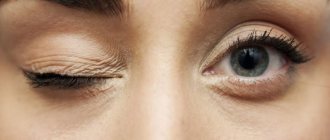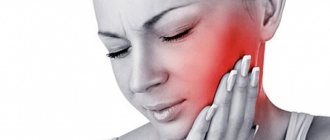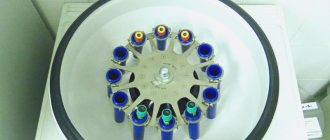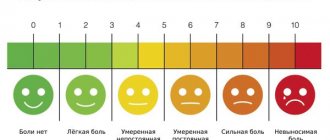- Treatment of nervous tics in adults
Nervous tics today are considered one of the most common mental and psychological problems in adults and children. This condition is a variety of involuntary muscle contractions, expressed in movements, sounds, and the like, which a person cannot control. Treatment of nervous tics in children and adults is currently one of the most important tasks for doctors due to the frequency of the problem and the need for professional intervention to get rid of it.
Symptoms of a nervous tic
Nervous tics have many symptoms and manifestations. This disease is expressed in various involuntary movements of the head, eyes, limbs, pronunciation of words and sounds. All this happens against the will of the patient, but at the same time he is often confident that he controls this condition. These movements are repetitive in nature. They can intensify, for example, with stress or fatigue, and then completely disappear or be reduced to a minimum.
Sometimes a manifestation of a nervous tic is shouting indecent words and showing indecent gestures. Also, sometimes the disease is expressed in itching, sneezing, coughing and similar phenomena that have no other cause.
In addition, a sign of a tic may be the repetition of other people's movements, gestures, words and phrases. This disease can also manifest itself in some other ways.
How to treat muscle twitching
Before treating muscle twitching, you need to conduct a thorough diagnosis and make an accurate diagnosis. This is a symptom, not a disease. Therefore, it will not be possible to treat it separately. After making a diagnosis, the doctor develops an individual course of therapy.
To treat muscle twitching due to osteochondrosis, we use the following methods:
- traction traction of the spinal column – relieves compression from the radicular nerves and restores the physiological dimensions of the intervertebral spaces, thereby quickly eliminating pain and discomfort in the muscles;
- osteopathy - to restore the normal position of the vertebral bodies, improve the condition of soft tissues (ligaments, muscles and tendons);
- massage – to restore microcirculation of blood and lymphatic fluid;
- therapeutic exercises and kinesiotherapy to restore the tone and performance of the muscular frame of the back.
In some cases, we use laser therapy, physiotherapy, electrical myostimulation and other types of therapeutic interventions. The course of treatment is developed individually. We recommend making an appointment for a free appointment with a vertebrologist, neurologist or orthopedist at our manual therapy clinic in Moscow.
Causes of nervous tics
Almost all causes of nervous tics are associated with disorders of the brain. But this problem arises for a variety of reasons. This imbalance can occur due to various factors, which experts divide into primary, secondary and hereditary.
The primary causes of a nervous tic can be such as: frequent stress, increased nervousness, severe fatigue, mental trauma, and the like. Secondary causes of the disease are caused by the underlying disease, which can have a negative effect on the nervous system. These are some infectious diseases, head injuries, mental illnesses, brain tumors, carbon monoxide poisoning, vegetative-vascular dystonia, birth injuries and other diseases. Also, the occurrence of a tic can be caused by diseases in which the patient was forced to make certain movements, and then they began to manifest themselves as a tic.
In addition, certain types of tics can be hereditary. They appear in children in whom one of the parents suffered from a similar illness. In this case, the problem begins to manifest itself in preschool age, and over time its manifestations may decrease or the malaise disappears altogether.
What to do if there is twitching under the right or left eye?
Twitching of the left or right eye occurs quite often in people. It can be either congenital or acquired. Let us dwell in more detail on acquired twitching. There are 2 types of psycho-emotional trauma:
- acquired as a result of stress (acute);
- chronic form.
If it twitches under the right eye or twitches under the left eye, you cannot leave it to chance. After a certain period of time, the pulsation can change, becoming a nervous tic.
Why is it twitching under my right eye?
Twitching under the right eye can be caused by a variety of reasons. In order to find out the cause, you should urgently visit a doctor. Many people make the mistake of thinking that if a problem concerns the eyes, only an ophthalmologist can solve it.
Why is it twitching under my left eye?
This may be an indicator of hemifacial facial spasm - the onset of a serious illness. If the symptom is also accompanied by noise in the ear, then we can talk about contraction of the stapedial muscle.
Why does the nerve under the eye twitch? In this case, everything is more complicated, since the nerve under the eye twitches and the reasons in vain seem to be of little seriousness. If you study the problem deeper, you will discover the complex human drama behind it. That is why you should seek help from a neurologist, and sometimes a psychotherapist.
Only after finding out the real reason why the eye is twitching, the doctor prescribes sedatives (usually glycine), as well as medications containing calcium (since it is the lack of calcium in the body that affects spontaneous muscle contractions).
However, whatever the reasons why the nerve twitches under the eye, the fact becomes obvious: you will not get by with medications alone.
First of all, follow simple rules:
- get more rest.
- get enough sleep.
- perform simple physical exercises.
- optimize your diet:
- Nuts, soybeans, blueberries, and sea fish will help.
- carbonated water, strong black tea and coffee should be excluded from the diet.
Nervous eye tic
Nervous eye tics are involuntary eye movements. They represent blinking, winking and similar actions. All these movements occur without the control of the person himself. However, some of them may resemble actions that occur when a foreign body enters the eye or certain types of eye diseases. Therefore, if signs of this disease appear, the doctor should rule out the presence of similar diseases in the patient, since it is known that sometimes the causes of a nervous tic of the eye may not be psychological, but caused by a malfunction of the organ of vision.
Nervous eye tic in an adult
A nervous tic of the eye can occur in an adult. It often presents as involuntary blinking or twitching. Most often, in adult working age, all this occurs due to extreme fatigue or stress. In addition, it can be caused by certain diseases of the nervous system, eyes and infections.
Nervous eye tic in a child
Nervous eye tics in a child in the modern world are considered to be a very common problem. Its manifestations are often very similar to the symptoms of the disease in adults. Moreover, its main cause is also serious overwork. Today's children are very busy with school lessons, as well as activities in clubs and sections. Excessive stress can lead to stress and tics. Also, their active passion for computers now plays an important role in the development of this problem among children. Watching videos and playing computer games for a long time contributes to severe fatigue of the eyes and brain, which sometimes leads to this disease. In addition, many children today experience stress, fear and neurosis due to watching television shows and movies with scenes that frighten them. Also, when such a tic appears, one should not exclude an unhealthy psychological environment at home or at school, kindergarten. Many children and teenagers painfully endure family quarrels, as well as ridicule from classmates or remarks from teachers and educators.
Treatment of nervous eye tics
Treatment of nervous eye tics is not indicated in all cases. Often it goes away on its own and without a trace after a long rest. Reducing the time spent at the computer, as well as alternating work and rest modes, will help improve your condition. You may also need to consult a psychologist to relieve stress. In addition, in some cases, when the cause of this condition is an eye or eyelid disease, treatment of the underlying disease will help.
Prevention
To prevent nervous tics, it is recommended to constantly consume figs. It contains vitamin B6, the absence of which can provoke a nervous tic.
It is important to maintain electrolyte balance and hydration status of the body. You need to drink at least 2 liters of fluid per day and eat a balanced diet.
If your eye begins to twitch, you should immediately take action and not let the process take its course. When a nervous tic appears, do a mini-exercise for your eyes. You need to blink for 2-3 minutes, as quickly as possible. If myokymia has passed, the reason is fatigue; if not, you need to consult a doctor.
Prevention measures:
- Take rest during long and intense work at the computer, reading.
- Avoid caffeine and drinks containing it.
- Protect the visual organs from exposure to ultraviolet radiation. Wear sunglasses when going outside.
- Surround yourself with calming colors. Place a blue figurine on the table next to the computer and look at it when your eye begins to twitch.
Treatment of nervous tics
Despite the fact that this condition, depending on its location and frequency or strength of manifestation, sometimes may not cause a person virtually any discomfort, attention should still be paid to it. In many cases, treatment for a nervous tic may not be necessary, since it disappears on its own after a certain time. This is sometimes facilitated by getting rid of fatigue and stress, normalizing mood and mental state by alternating work and rest, playing sports, focusing on pleasant hobbies, changing activities and similar factors.
Treatment of nervous tics in adults
But, if the illness lasts quite a long time, often recurs and returns, or causes discomfort to the person, you should consult a specialist. Treatment of nervous tics in adults is carried out by psychologists and psychiatrists, as well as, in some cases, by other specialists. To get rid of this problem, you may need to change your job to a place with a less stressful schedule and a more comfortable psychological environment. In many cases, it helps to consult a psychologist who will give advice on how to get rid of stress and help resolve many work and family conflicts. Long walks, sports, proper nutrition and interesting activities also help improve the condition. In addition, turning to a psychologist can help get rid of insomnia and depression, which also often lead to the appearance of a nervous tic.
If a tic is caused by some disease, then in order for it to go away, the disease that led to its appearance should be treated. Therefore, in this case, consultation with a psychiatrist, therapist, neurologist, surgeon and other doctors may be required. Treatment in this situation will be aimed at getting rid of the underlying disease or reducing its manifestations, reducing the frequency of exacerbations and alleviating the patient’s condition.
Treatment of nervous tics in children
Treatment of a nervous tic in a child must be carried out by a specialist. Even if the problem goes away quite quickly on its own, parents should still inform the doctor about this within a reasonable time in order to prevent the problem from returning or more serious consequences. Indeed, in any case, this condition, at a minimum, indicates that the child has stress, fear or overwork. In addition, tics in children are often caused by diseases of many other organs and systems, as well as hereditary factors. In this situation, tic treatment will be aimed at relieving the symptoms of the underlying disease. Therefore, in each specific case, the list of doctors, in addition to the pediatrician, may be different.
Nervous tic treatment with drugs
In some cases, when the manifestation of the disease is very strong and does not decrease over time, it may be necessary to treat a nervous tic with drugs. Usually in such a situation, medications from the group of tranquilizers are prescribed. But sometimes it may be necessary to take other medications. If the disease is very severe, strong psychotropic drugs, like haloperidol, can be prescribed. As a rule, such treatment is indicated only for adults. In childhood, doctors try, if possible, to avoid the use of such therapy.
If a nervous tic is caused by various diseases and is secondary, then its treatment is getting rid of the underlying disease. For example, if the problem is caused by diabetes, then properly selected insulin therapy will help to overcome the tic. Even if a tic is a consequence of a chronic disease that cannot be completely cured, getting rid of frequent exacerbations and improving the general condition against the background of properly selected medication, surgery or other treatment will help get rid of or reduce the manifestation of this problem. In this case, treatment should be carried out both by a neurologist and other specialists with whom the patient is registered. This is equally true for both children and adults suffering from various forms and manifestations of nervous tics.
Nervous tic treatment with folk remedies
Nervous tics can also be treated with folk remedies. Infusions of such well-known medicinal herbs as valerian and motherwort help especially well with this ailment. They have good sedative properties and virtually no side effects. In addition, folk methods of getting rid of this unpleasant illness include acupuncture and massage. True, today such methods and medications are sometimes prescribed by professional doctors in conjunction with treatment using traditional medicine. Also, to eliminate the manifestation of tic, some other means and techniques that can be classified as folk can be used. The greatest effect in treating the disease comes from a combination of several methods.
Treatment of nervous tics in Moscow
Today, getting rid of this disease, which is so widespread in the modern world, is carried out by both specialists from public clinics and hospitals, as well as doctors from commercial clinics and medical centers. Therefore, where to treat a nervous tic in Moscow is the choice of each patient. State clinics can significantly save the patient’s finances, since treatment there is free. But sometimes it is very difficult to call it quality, since such clinics often employ far from the best specialists, and they do not have the necessary equipment to perform correct diagnostics. True, commercial medical institutions must be chosen wisely. You should pay attention not to the cost of diagnosis and treatment, but to reviews and information about specialists, treatment methods and its effectiveness. All this can be easily found on the Internet. In addition, now almost all of us have friends and acquaintances who have consulted doctors about this disease. Their recommendations and reviews are the most honest and will help you choose the right specialist and clinic.
When choosing a medical institution to eliminate nervous tics, you should pay attention to the duration of its activity and information about the doctors working there. It is good if the clinic has been operating for several years and has all the appropriate licenses. It's also a good idea if some of her doctors have advanced degrees. It is important to take into account that, in addition to neurologists, psychologists and psychiatrists, other specialists are also admitted there. After all, it may often be necessary to consult doctors of various specialties to make a correct diagnosis and prescribe treatment. In addition, sometimes diagnostics may require high-tech equipment, which not all medical centers have. This is also worth considering when choosing a medical institution. Those who want to quickly and efficiently get rid of an illness should find out what treatment methods are used in the chosen medical center. It’s great if a complex of medicinal, psychological and other methods are used.
Today in Moscow there are clinics specializing in the treatment of tics and other similar problems. They employ specialists with extensive experience who are proficient in the most advanced methods of treatment and diagnosis. Many of these centers examine both adult and young patients and can provide advice from a variety of different specialists. There are now centers with very affordable prices and excellent quality of treatment. Therefore, choosing a decent medical institution to get rid of this problem is not difficult. You just have to carefully and responsibly study all the available information about them in order to actually contact a trusted and reputable clinic.
Features of pathology diagnosis
If at least one sign of hyperkinesis is observed, you should immediately seek help from neurologists and psychiatrists. Consultation can be obtained at our center; we pay attention to every symptom and offer an effective solution to the problem. To make a correct diagnosis, our specialists prescribe a comprehensive diagnosis, which consists of:
- initial collection of anamnesis. Thus, the doctor establishes the period and circumstances when hyperkinesis occurs. Its nature, location, and duration must be determined. It is very important to take a medical card with you to your appointment to study current and past illnesses;
- neurological examination of patients;
- prescribing biochemical and clinical blood tests;
- conducting instrumental research. Depending on the person’s well-being, the doctor may prescribe an EEG, skull x-ray, CT or MRI;
- appointment of additional consultations with specialized specialists (traumatologist, psychiatrist, oncologist).
When carrying out procedures, specialists separate pathology from the patient’s habits, which arise involuntarily at the time of an emotional state. Also, doctors must establish and treat the factor that caused the nervous tic.
Reviews about the treatment of nervous tics
Therefore, if you or your loved ones have a manifestation of this disease, it is worth visiting a specialist within a reasonable time to establish the correct diagnosis. But before that, it is advisable to read reviews about the treatment of nervous tics, of which there are now many on the Internet. This will help you choose the right clinic and doctor. You can also get acquainted with the most common signs of the disease and methods of its treatment on the Internet. However, this information should be taken for informational purposes only. After all, this problem should only be resolved by a qualified specialist, and in serious cases you should not hesitate to contact him. And it is especially important not to self-medicate and not to rely only on information from the Internet and advice from friends if a child develops a nervous tic. In this situation, if its manifestations do not disappear on their own, after a few days and after proper rest, it is worth consulting a doctor within a reasonable time. In this case, you should be especially careful when choosing a specialist and a medical institution. Otherwise, unqualified treatment and diagnosis can significantly harm the growing body.
In addition, regardless of who suffers from a nervous tic - an adult or a child, you should not blindly believe advice from the Internet or reviews of friends and acquaintances. After all, the causes of this disease are different in each case, and each organism is unique. Therefore, if the disease does not go away on its own after rest or a change of environment to a calmer one, it is worth visiting a doctor. Moreover, this problem may be a symptom of a very serious disease that requires immediate medical attention. And the manifestations of tics can sometimes turn out to be very significant and dangerous, which only a specialist can cope with.
Why is constant muscle twitching dangerous?
Constant muscle twitching is dangerous to the musculoskeletal health of the human body in the long run. It is important to understand that muscle twitching in different parts of the body leads to a disruption in the transmission of nerve impulses. As a result, some of the myocytes may contract while the underlying tissue relaxes. This is how ectopic foci of unstable muscle tension (trigger points) are formed. They cause constant muscle pain and partial destruction of myofibrils.
The feeling of muscle twitching is not just an unpleasant feeling. Blood microcirculation is disrupted at the capillary level, and dysmetabolic processes begin. Such a muscle loses its ability to provide complete diffuse nutrition to the cartilage tissue of large joints of the lower upper extremities and intervertebral discs. As a result, deforming osteoarthritis, osteochondrosis and other pathologies develop.
Even if you are sure that the twitching is associated with osteochondrosis, do not hesitate to seek medical help. The sooner you start treatment, the higher the chances of a full recovery.










